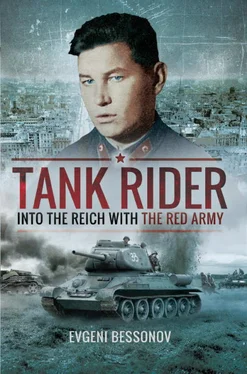They unloaded us in the town of Kamyshlov in the Sverdlovsk region, some 180 km to the east of Sverdlovsk (now Yekaterinburg). The ones that arrived on that train were distributed among four companies – the 13th, 14th, 15th and 16th, which formed the fourth battalion. I ended up in the 15th company. Those who stubbornly and consistently refused to study, as well as some former criminals, were sent into army units that were in process of formation for the front in the Urals region.
We were sworn in at the academy on 16 November, 1941, and we were all officially accepted as cadets. First we received boots with puttees instead of jack-boots. We had a hard time with them – you try to wrap it around your leg and all of a sudden it slips out of your hand, and you have to start all over again. During that period almost all soldiers of the Red Army had boots with puttees, especially the infantry. They issued winter uniforms to us in the academy (that was when puttees were replaced by jack-boots): cotton foot-cloths, woollen tunics and padded trousers, a padded jacket to be worn under the greatcoat and mittens. We did not have winter hats, though, and we had to walk around in garrison caps. Some put a towel under a garrison cap when the temperatures dropped to minus 20–25 degrees Celsius. That winter frosts in the Urals region were sharp, we saw sparrows freezing to death in mid-flight – I am not making this up. We received winter hats as late as January 1942. We lived on the first floor of a huge two-storey barrack. We slept on two-level metallic beds. We ourselves stuffed mattresses and pillows with hay in the administration platoon of the academy. We were issued two sheets and a cotton blanket. There were two large Ural-style wood stoves in the opposite corners of the barrack. Every floor housed two companies of 120 men each. Companies were separated by a wide corridor, where we would all fall in for a morning inspection (form no. 20 – the code for a lice check) and an evening inspection. In the ends of the barrack building there were a storage room, officers’ room, a rifle park (or, more accurately, a rifle pyramid), bathroom and toilets. Classes lasted from 10 to 12 hours, including individual study time. The reveille was at 6:00 or 6:30, I do not remember exactly, taps were at 23:00. We would get very tired during the day, as we only had classes outdoors, so we were always hungry and sleepy. They fed us quite well. They gave us some 750 grams of bread a day, sugar at breakfast and dinner for our tea. Breakfast as a rule included porridge, a piece of butter (20 grams), tea and bread. For lunch we had soup or schi based on meat bouillon, mashed potatoes or porridge with meat for the second course, stewed fruit and bread. Dinner was quite poor – beetroot salad or a piece of boiled fish (sometimes herring) with potatoes, tea, bread and sugar. Cadets had even better food than commanders (in 1941 and 1942 officers in Red Army were still officially referred to as commanders – translator’s comment) in their own canteen. However, we were using a lot of energy and spending all the daytime in the frost outside, so our young bodies required more food and sleep. The sleeping time was insufficient for us, although we had a rest time after lunch. Some cadets could not take such physical stress and grew noticeably weaker and thinner, the others, not used to such strong frosts, had their feet frost-bitten.
Our company commander was Senior Lieutenant Suleimenov, a Kazakh, physically strong and an excellent training officer. The company had four platoons, 30 cadets in each platoon. The academy had a total of 20 companies (5 battalions). Lieutenant Khrapovitski was leader of my platoon, the 1st, and Lieutenant Ilyin led the 2nd platoon. I forget the names of the other two platoon leaders. The majority of cadets in the 1st and the 2nd platoons were Muscovites, while the 3rd and the 4th platoons mostly had local men from the Urals and adjacent areas.
The head of the academy was the kombrig (pre-war and early war Red Army rank that corresponds to Major-General – translator’s comment) (he had one diamond on his collar tab), though the army had already introduced general ranks. We saw him quite rarely, mostly during parades, which we only had two or three times during our stay in the academy. They said that he was just recently released from jail. He had been arrested as a former officer of the Tsar’s Army, as had happened with Rokossovski, Marshal of Soviet Union, and General Gorbatov.
In mid-December, 1941, our company was sent to a winter camp outside the city, where we lived in dugouts and slept on two-level plank-beds. There was no running water there, we had to wash ourselves with snow after the physical exercises, which we had to do outside in any frost, and by morning temperatures dropped to as low as minus 30–35 degrees Celsius! We skied 18 kilometres to banya three times a month (a banya is a traditional Russian steam bath – translator’s note) . We also studied drill and ceremonies: ceremonial step, turning to left, right, around and saluting (at that time they called it greeting each other and the commanders). We studied weapons, service and field manuals. We also studied tactics – we rehearsed attacks on the enemy, as well as platoon and company action in defence. Sometimes we had range practice. After a month or a month and a half we returned to barracks in the city.
We were forbidden to leave the military area and go to town, but there was nothing to do there anyway. We had a post office, a store with all kinds of small things that a soldier might need, such as threads and needles. There was also a club with a cinema and a library. On Sundays (we cadets had a day off as well) I went to the library and read newspapers there, usually Pravda ; I borrowed fiction, took it to the barracks and managed to find time to read it there. We marched in formation to see movies; normally that was during the morning before lunch. I only remember one film – The Destruction of German forces at Moscow . During the other films I would fall asleep, just like so many other cadets, even though the heating of the hall was very poor. When we were on duty in the company – a cadet on duty and three orderlies – we ran to the station cafe at the time of arrival of a train from Moscow to get some wheat porridge – it was not millet, but wheat porridge. There was nothing else in the cafe. We normally had it poured into the fire bucket. Several pieces of bread were also given with the porridge. We would finish the bucket of porridge during the night, and if we had porridge left, we woke up a couple of our friends. By morning the bucket was to be cleaned and hung on the fire-fighting stand again. There were different cadets in the academy – honest, responsive, helping each other, sharing food parcels with close friends according to the cadets’ rule of thumb. Others were dishonest and did not respect even the elementary requirements of discipline. The cadets themselves dealt with thieves. In any case, the older cadets did not abuse the younger ones, or if they did, we did not know anything about it. It was easy for me to overcome the difficulties of military service, the same with the frosts. I was the third tallest cadet in the company. The tallest was Anatoly Pavlovich Zlobin – an outstanding writer after the war; he died in 2000. We were drafted from Moscow together. He was a mortar-battery commander at the front. I had good relations with all the men in the company, while in the platoon we were all good friends – we were all Muscovites from the same neighbourhood and graduated from neighbouring schools, we even had common acquaintances. We had nothing to fight about. Physically I was no worse than the other cadets in the platoon and the company. I was not outstanding, but I stood up for myself. I did not flatter anyone and didn’t tell tales. The company commander was somehow distant from us, we did not see him every day. In the evenings we had classes with assistant platoon leaders; as a rule these were older cadets, not the former schoolboys, but cadets that had entered the academy earlier than ourselves. Some men had a hard time with the studies, and two cadets could not take it. One local man, Lisitsyn, shot himself in a dugout during his company guard duty. The second guy, Vischnevski, a native of Moscow, escaped. They looked for him for a long time, but never found him. Both incidents were emergency cases for the company. Later there was a rumour that a letter came from Vishnevski, in which he wrote that he was at the front and asked not to be considered a deserter. However, the letter was not officially read to us – probably so that other cadets would not follow his example.
Читать дальше












